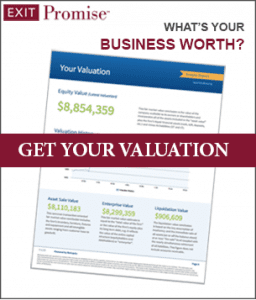- Best Business Buyer Type For Your Business - November 4, 2024
- New Overtime Rule Increases the Salary Exemption Thresholds - September 27, 2024
- Maximizing After Tax Proceeds When Selling Your Business - June 7, 2024
Do you have a Question?
Ask below. One of our Investors or Advisors will Answer!
 When a business owner begins to negotiate the sale of his or her business with buyers for the first time, he or she will inevitably face a difference between the buyer’s offer price and the desired selling price. It’s at this point when a lively debate between the parties will occur over the underlying reasons for the business’s asking price being what it is. At this time a seller will be well-served if able to offer justification for an increased business valuation and a higher business selling price.
When a business owner begins to negotiate the sale of his or her business with buyers for the first time, he or she will inevitably face a difference between the buyer’s offer price and the desired selling price. It’s at this point when a lively debate between the parties will occur over the underlying reasons for the business’s asking price being what it is. At this time a seller will be well-served if able to offer justification for an increased business valuation and a higher business selling price.
Developing concrete reasons to substantiate a higher asking price should start long before the business is on the market for sale. In addition to developing good cash flow, attracting a strategic buyer, having consistent revenues and no concentration risks, business owners should continuously take these three steps if they ultimately want to sell their business at a premium price:
Identify All Intangible Assets
Intangible assets are components of a business that add value beyond the tangible assets such as equipment and monetary factors such as EBITDA. These include intellectual property such as trade secrets, customer relationships, permits, contracts, and more. Intangible assets can vary greatly from business to business, as different types of information, processes, and methodologies are valuable to different industries.
Business owners should keep a running list of their intangible assets as the business grows. This will make it easier when the time comes to sell, as the owner can present these assets to their own Business Valuation Expert and the buyer’s team of acquisition experts.
The following list provides more than a few examples of intangible assets that business owners should be aware of and document carefully:
- Advertising Campaigns and Marketing Materials
- Website, domains and subdomains
- DBA Certifications
- Contracts, Current and Backlogs
- Computer Database
- Copyrights, Registered and Claimed Trademarks
- Patents
- Custom-built Plant and Offices
- Distributorship Agreements
- Employee Training Programs and Manuals
- Government Designations
- Licenses
- Trade Secrets
- Vendor Relationships
- Trained Employees and Employment Agreements
- Royalty Agreements
- Proprietary Designs, Documents and Delivery Systems
- Customer Base
- Mailing List (Email and traditional Mail)
- Owner’s Reputation and Industry Expertise
Protect Your Intangible Assets
After identifying the intangible assets, business owners should take steps to protect them. For intellectual property, implementing confidentiality, nondisclosure, and non-compete agreements can help prevent proprietary information from leaving the company.
Businesses should also consider filing for trademarks, copyrights, or patents, depending on the type of products or services the business provides. For potential names and logos to be trademarked and used throughout the U.S., it is important to check with the United States Patent and Trademark Office to ensure that the mark is legally protectable and not already in use.
With so much information stored digitally, it is essential to invest in secure record-keeping software and programs. Business owners should work with their website developers or IT departments to ensure their sites are not vulnerable to hackers.  Employees should use strong passwords, password protect documents, and limit sharing of sensitive files with any third parties.
Employees should use strong passwords, password protect documents, and limit sharing of sensitive files with any third parties.
Defend Your Intangible Assets
If someone steals or leaks information about an important intangible asset, the business should be prepared to take legal action. In order to be successful in a trade secret lawsuit, business owners must prove they do make an effort to keep the information in question secret, and that it provides a competitive advantage to the business. This is one reason why the careful documentation of intangible assets is crucial for every business. Identifying and protecting the assets allows the owner to defend them should the occasion arise.
During the early stage of the acquisition process, it’s from an outsider’s perspective that the buyer typically views the financial statements and other more tangible factors related to the business. It’s not until the gap between the asking price and the offer price is defined, that most buyers really begin to explore fully the business, its back-end operations, and all of the important intangible assets developed and deployed to create a valuable business.
So it’s up to the business owner to identify, protect and defend those valuable intangible assets. Diligently doing so, will likely provide a business owner with the means to receive his or her asking price.












